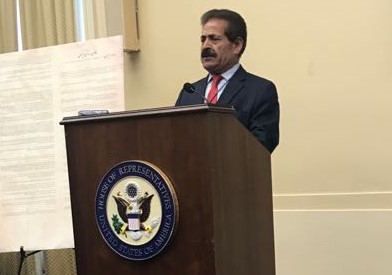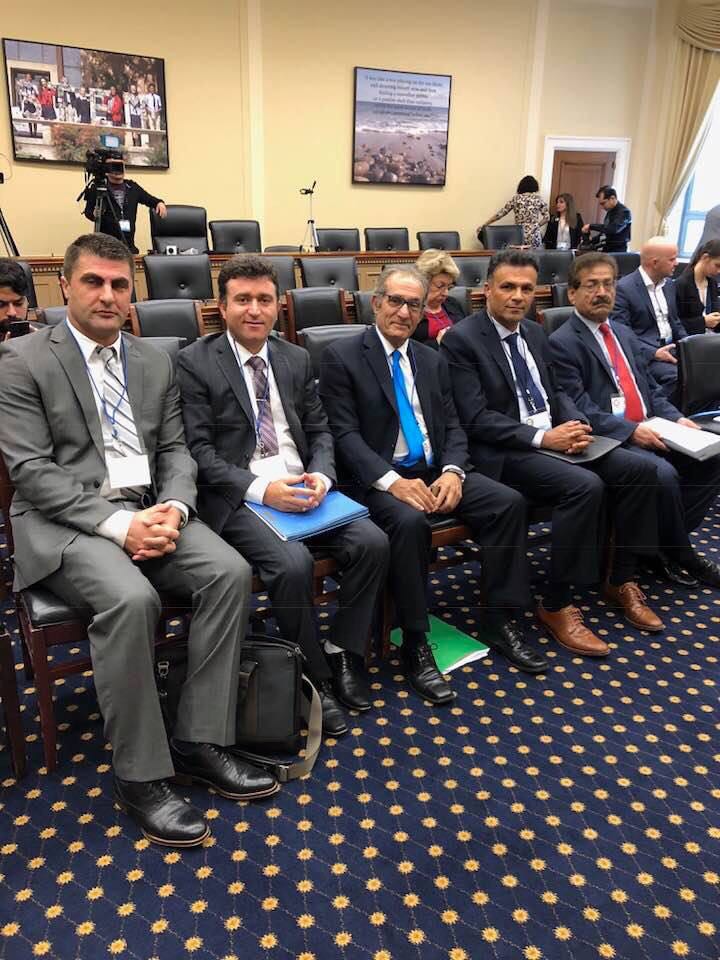Hosseinbor Chairman of the American-Baluch Council speech at the US Congress

On Tuesday, June 26, Dr. M. HOSSEINBOR, Chairman of the American-Baluch Council, spokes at the Iran’s Democratic Transition Conference in the US Congress.
The text of his speech is as follows;
As the Chairman of the American-Baluch Council, I would like to thank the Honorable Congressman Dana Rohrabacher, the Honorable Congressman Ted Poe, for hosting this important and timely conference on Iran’s transition from the current clerical dictatorship to a secular democracy. The best definition of democracy is crystallized in the eternal words of President Lincoln: “A government of the people by the people for the people”. I also thank President Trump and his distinguished National Security Team, including Secretary of State Mike Pompeo, Secretary of Defense General Mattis, and Ambassador John Bolton for their unwavering support of Iranian peoples in their struggle for liberty from the tyranny of the Islamic Republic.
As the representatives of Iran’s diverse ethnic and religious groups, we have assembled here in this great Hall of the US Congress to express our solidarity with our brethren in Iran and, as the NIC stated, “to deliberate freely and safely about the future of our homeland”. We all agree that the days of the Islamic Republic are numbered; that we are united in our opposition to the clerical dictatorship; and that we aspire for a secular, federalist, and democratic Iran where all Iranians can enjoy equality, freedom, and progress. These are views and values that enjoy the full support of the Iranian Baluch as well.
The Baluch have opposed the Islamic Republic ever since its inception in 1979 and have strived to preserve their language and culture and to secure a degree of self-rule within a secular, democratic, and federal Iran. In addition to their ancestral homeland Baluchistan, Baluch speak their own language called Baluchi, have their distinct culture, share a common history, and adhere to Sunni Islam while Persians follow Shi’ite Islam, the official state religion of the ruling clerics. For these reasons, Baluch have been subjected to constant ethnic, religious, cultural, and economic discrimination and political and military repression under the clerical dictatorship. This in turn has forced the Baluch to resist the Islamic Revolutionary Guards through both passive and armed resistance. The IRG have suffered some of its heaviest casualties in Baluchistan in recent years, including some of its top generals.
With a population estimated at about 7 to 8 million, Iranian Baluchistan has been divided into three parts to expedite its integration and assimilation into Iran. The largest part constitutes the “Province of Sistan and Baluchistan”. It covers more than 181,578 square kilometers, which is in itself the largest province in Iran. The second part of Iranian Baluchistan is officially known as the Province of Hormuzgan for its location on the Strait of Hormuz. The third and northern part of Iranian Baluchistan is included in the neighboring Persian-speaking Provinces of Kerman and Khorasan. All three parts combined cover around 280,000 square kilometers.
We will hear the motto “a nation of nations” when celebrating US independence on the 4th of July next week. Indeed, Iran is also a nation of nations, comprised of Persians, Baluchs, Kurds, Arabs, Turkmans, Turks, Lors, and other ethnic/religious groups. Therefore, it is the responsibility of all these national groups to decide, with equal voice, the future of Iran and to solve the chronic internal crisis brought about by extreme centralism imposed by successive dictatorships, whether clerical or monarchical. To discharge this historic responsibility, we need an inclusive forum, capable of bringing representatives of all national groups together to debate the draft of the proposed constitution, and to form a genuine alternative to theocratic rule. Only such a democratic process will have the legitimacy to be accepted by the peoples of Iran and to be supported by the US and other world democracies.
As you know well, both the constitution of the Islamic Republic and the preceding constitution under the monarchy failed miserably in instituting democracy or bringing peace and prosperity to the Iranian people. They led to extreme centralism and absolute power exercised by the supreme leader under the current regime and by the Pahlavi kings under the monarchy. Such centralism and dictatorship go hand in hand and are the root causes of the chronic political instability, economic backwardness, and social upheavals that have afflicted Iran under both regimes, thus making Iran a prime example of the famous saying “Power corrupts and absolute power corrupts absolutely.” By comparison, the US constitution has enabled the American people to transform their country in 240 years into a great bastion of democracy and the most advanced industrial, economic, military, and political power in human history. Happy 4th of July to my fellow Americans and these great United States of America.
Therefore, we do not need to reinvent the wheel, but learn from such successful models in drafting our constitution. The NIC draft is a first step, but requires further deliberations and substantial changes to be more inclusive, incorporate a bill of rights, clearly define the powers of the federal government vis a vis the powers of the states, taking into account demographic, linguistic, and historical factors in constituting the federating states. The Baluch further believe that the future of Iran as a modern and democratic state can only be guaranteed through a voluntary association of all its national groups.
While affirming their right to self-determination under international law, the Baluch could vote for any constitution which, at a minimum, is based on and guarantees democracy, federalism, rule of law, social justice, and human rights, including equal rights for women and minorities. In addition, such a constitution should clearly state that the central government shall be responsible for national defense, foreign affairs, currency, and national planning. All other powers shall be reserved for self-governing federating states, as is the case with all federal democracies.
Moreover, the proposed federal constitution shall treat all Iranian citizens, regardless of gender, race, or religion, as equal under the law and shall protect and guarantee freedom of speech, freedom of the press, freedom of association, freedom of religion, and free and fair elections. The federal constitution shall also ensure that all national groups constituting Iran will have equal opportunity to practice and teach their respective cultures, languages, and histories, as well as to develop their economies and homelands. The federal constitution shall also protect the rights of religious minorities, including Sunnis, Bahais, Christians, Jews, Zoroastrians, and Sufis.
The constitutions of the federating states shall also guarantee the same rights for their respective citizens. Federal and state constitutions shall mandate that federal and state governments be based on elected legislative and executive branches as well as independent judiciaries.
Therefore, NIC draft constitution is not acceptable in its present form unless and until it is revised and amended to recognize and incorporate the Baluch demands described herein.
Any failure to respond to the legitimate demands of the Baluch and other national groups could lead them with no choice but to exercise their rights to self-determination as recognized in international law instead of being subjected to perpetual tyranny and dictatorship. The Baluch invite all freedom-loving countries to join the US in supporting peoples of Iran in entering the ranks of world democracies and in welcoming a secular and democratic Iran back into the international community in the aftermath of the Islamic Republic.




















